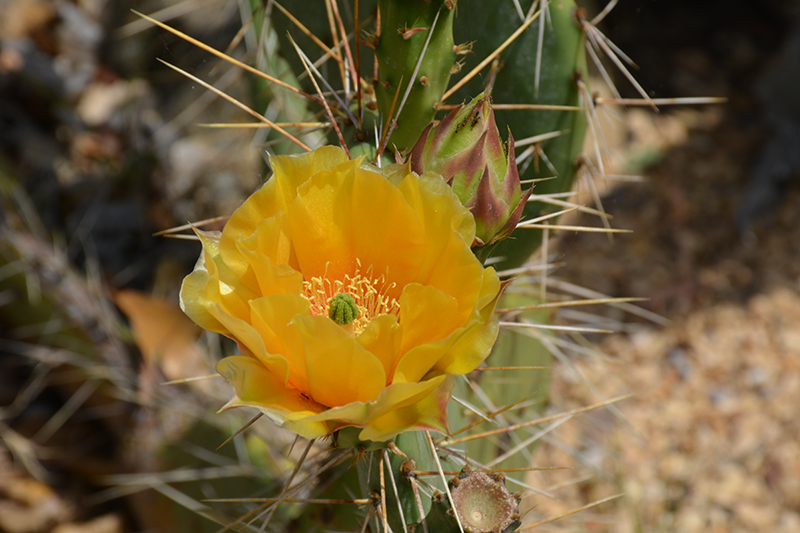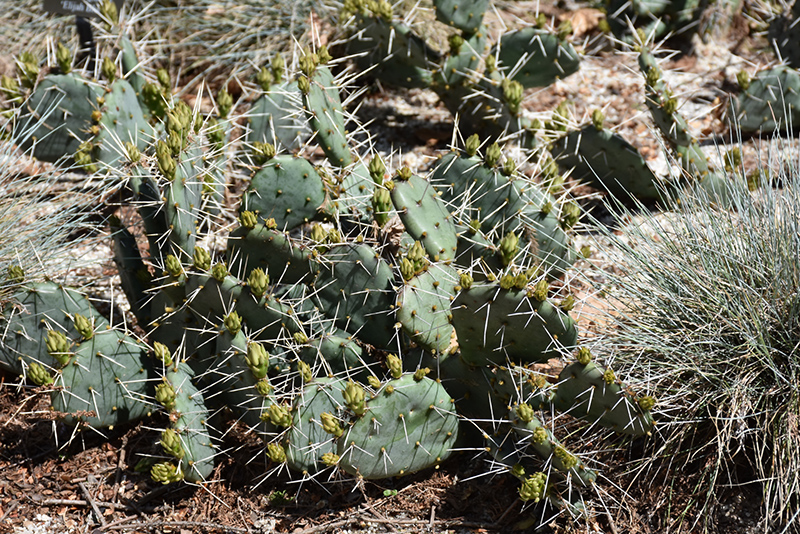Tulip Prickly Pear Cactus*
Opuntia phaeacantha
* This is a "special order" plant - contact store for details
Height: 6 inches
Spread: 12 inches
Sunlight:
![]()
Hardiness Zone: 8b
Other Names: Desert Prickly Pear, Mojave Prickly Pear
Description:
This southwest native cactus produces orange-yellow flower buds that resemble a tulip; buds then fully open to sunny yellow blooms; excellent in containers or rock garden feature
Ornamental Features
Tulip Prickly Pear Cactus is a member of the cactus family, which are grown primarily for their characteristic shapes, their interesting features and textures, and their high tolerance for hot, dry growing environments. As an 'opuntiad' type of cactus, it doesn't actually have leaves, but rather modified succulent stems that comprise the bulk of the plant, and which are designed to retain water for long periods of time. This particular cactus is valued for its upright and spreading habit of growth This plant has lemon yellow cup-shaped flowers with red eyes at the ends of the stems in mid summer, which emerge from distinctive dark red flower buds, and which are interesting on close inspection. It features an abundance of magnificent burgundy berries from late summer to late fall.
Landscape Attributes
Tulip Prickly Pear Cactus is a tiny succulent evergreen plant with an upright spreading habit of growth. As a type of cactus, it has no true foliage; the body of the plant is wholly comprised of a linked series of spiny bluish-green pads which are connected together to form the branches of the plant.
This plant will require occasional maintenance and upkeep, and should never be pruned except to remove any dieback, as it tends not to take pruning well. Stray segments or shoots can be carefully removed or thinned to control the overall form and spread of the plant. Deer don't particularly care for this plant and will usually leave it alone in favor of tastier treats. Gardeners should be aware of the following characteristic(s) that may warrant special consideration;
- Spiny
Tulip Prickly Pear Cactus is recommended for the following landscape applications;
- Rock/Alpine Gardens
- Border Edging
- General Garden Use
- Container Planting
Planting & Growing
Tulip Prickly Pear Cactus will grow to be only 6 inches tall at maturity, with a spread of 12 inches. It grows at a medium rate, and under ideal conditions can be expected to live for approximately 10 years.
This plant should only be grown in full sunlight. It requires an extremely dry, well-drained growing location, and will usually die in standing water. It is considered to be drought-tolerant, and thus makes an ideal choice for a low-water garden or xeriscape application. Like most succulents and cacti, this plant prefers to grow in poor soils and should therefore never be fertilized. It is not particular as to soil pH, but grows best in sandy soils. It is quite intolerant of urban pollution, therefore inner city or urban streetside plantings are best avoided. This species is native to parts of North America. It can be propagated by division.
Tulip Prickly Pear Cactus is a fine choice for the garden, but it is also a good selection for planting in outdoor pots and containers. It is often used as a 'filler' in the 'spiller-thriller-filler' container combination, providing a mass of flowers against which the larger thriller plants stand out. Note that when growing plants in outdoor containers and baskets, they may require more frequent waterings than they would in the yard or garden.
* This is a "special order" plant - contact store for details



